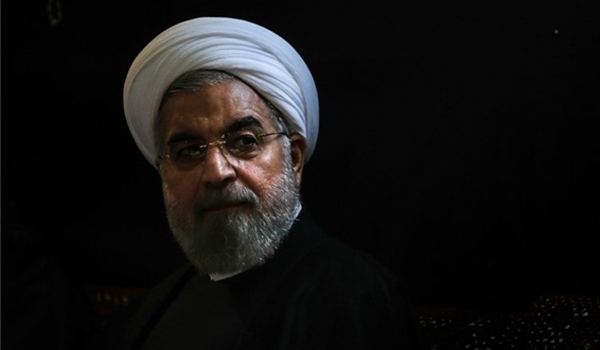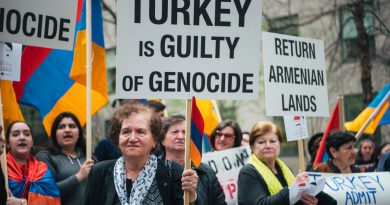Iran—An Isolated and Loathed Regime
by Mahmood Hakamian
The regime’s international isolation, unprecedented since the Iran-Iraq war, is the result of it shooting itself in the foot
The UN General Assembly’s annual session has been made into a mockery by the likes of Iranian dictators. Hassan Rouhani, the caliphate’s “president,” usually uses the podium to fan lies just about everything.
This year, however, Rouhani and his cronies were even more isolated, and virtually no one listened to him.
In UN special committees, the mullahs’ regime is targeted for its violations of international laws. The prime example is the UN Third Committee, which has been examining human rights violations in Iran for the past 38 years. This year, not only did the Third Committee condemn the regime for human rights abuses, but the First Committee scorched it for violations of international disarmament and global security standards. The theocratic regime faced an unprecedented reaction by the international community for its hostile and belligerent behavior.
Unprecedented International Isolation of the Regime
The regime’s international isolation, unprecedented since the Iran-Iraq war, is the result of it shooting itself in the foot by announcing a step-by-step exit from the Joint Comprehensive Plan of Action (JCPOA), otherwise known as the 2015 international nuclear deal with world powers.
The regime has announced that it has completed three steps in leaving the JCPOA and it would soon take the fourth step. Although the JCPOA is on life support, it is the only breathing space left for the regime. Before the JCPOA, the General Assembly’s First Committee refused to get involved with the regime’s violations because the appeasement policy was in full swing toward the mullahs’ regime.
While an international consensus was formed against the regime in the UN General Assembly this year, Rouhani outrageously claimed in his trip to Azerbaijan a few days ago that he initiated a new plan for a “World devoid of violence.” As was expected, Rouhani’s plan was not recognized in the General Assembly or in related UN committees. The mullahs’ regime failed to capitalize on Rouhani’s UN trip, and it was not even welcomed by state-run media outlets at home.
Rouhani and his foreign minister Mohammad-Javad Zarif tried hard to sell the hollow notion of U.S. isolation in the world after President Donald Trump withdrew it from the JCPOA.
Commerce Figure Says #Iran’s Regime Suffers From Regional Isolationhttps://t.co/FzrJBoaraT pic.twitter.com/LYVs2rnZPK
— NCRI-FAC (@iran_policy) November 23, 2018
Third Committee Condemnations
It has become a tradition for the UN Third Committee on Human Rights to condemn the mullahs’ regime’s human rights violations over the past 38 years. But this year’s mood was even more unsympathetic toward the clerical regime. Many representatives from different countries highlighted the mullahs’ gross violation of human rights. Dr. Javaid Rehman, the UN Special Rapporteur on the situation of human rights in Iran, expressed grave concern over the high number of executions in Iran. The mullahs’ regime is the record holder of executions per capita in the world.
The highlight of Rehman’s report this year is his emphasis on the Iranian regime’s execution of minors or children. He said in his report: “In 2018, there were seven reported cases of executions of child offenders. There are currently an estimated 90 individuals on death row who were all under the age of 18 at the time of their alleged offenses. Among the most recent cases, on 25 April 2019, two 17-year-old children, Mehdi Sohrabifar and Amin Sedaghat, were executed.”
The Special Rapporteur also mentioned that he is not alone in his concern over the execution of minors. He said that Ms. Michelle Bachelet, the UN High Commissioner for Human Rights, has the same opinion: “The position of special procedures mandate holders and the United Nations High Commissioner for Human Rights on child offender executions has been unequivocal. They have stated that this practice is absolutely prohibited and must end immediately.”
A Price for Freedom
The Iranian regime has been condemned at least 65 times in the United Nations in the span of four decades over its human rights abuses. Although the resolutions have been non-binding, they have been a constant reminder that the regime lacks credibility both at home and abroad.
#Iran Will See More Protests and Isolation in 2019
— NCRI-FAC (@iran_policy) January 2, 2019
At the start of 2018, Iran was besieged by nationwide anti-regime protests and the world was watching. These protests continued over the course of the year and into 2019,..https://t.co/8Rdz3qam8w #IranProtests pic.twitter.com/E87tUo1hmJ
The Iranian Resistance has shouldered the responsibility to lead a relentless effort for exposing the mullahs’ human rights violations. At first, it may appear that human rights abuses are crystal clear in Iran. But it has not always been as obvious as it is today. It took the People’s Mojahedin Organization of Iran (PMOI/MEK) many years and millions of hours of tireless work to get to this point. Over 100,000 MEK members and supporters have lost their lives defending human rights and freedoms in Iran.
Article first published on National Council of Resistance of Iran.



